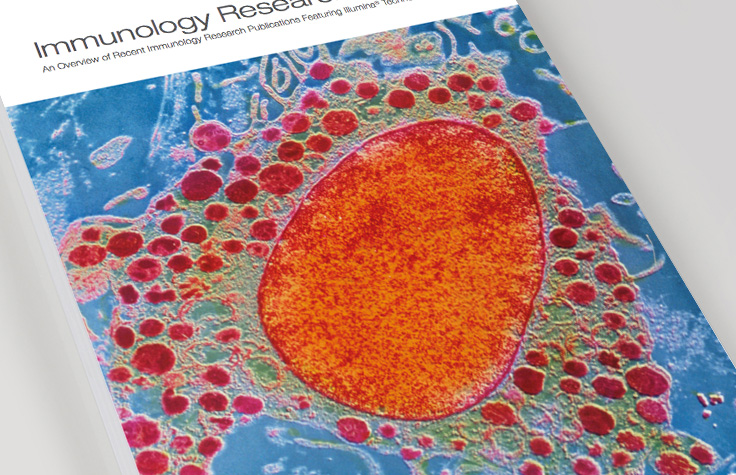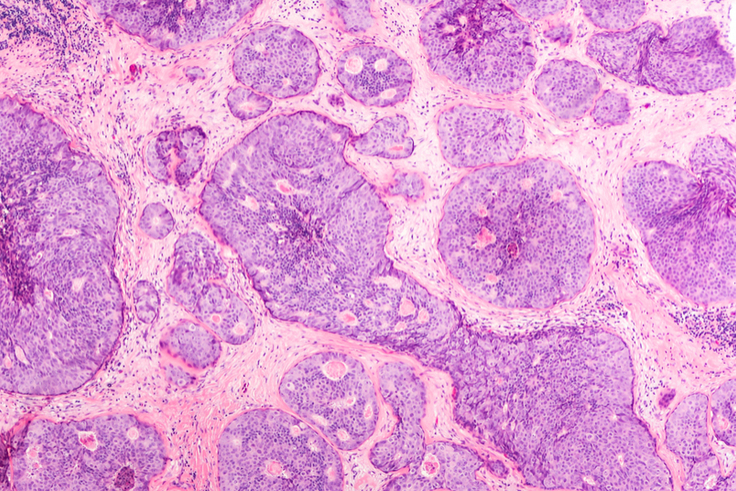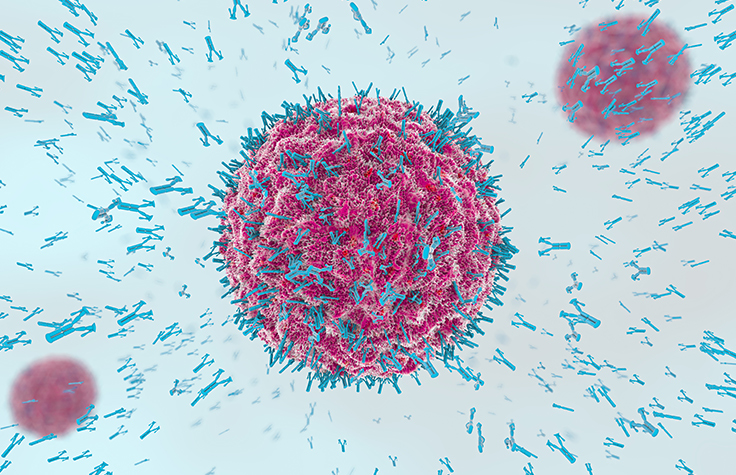Immunogenomics Research
Immune-related genetic variation
Genomic analysis technologies can advance immunology research by elucidating immune cell function and signaling. The causes of complex autoimmune diseases (such as lupus, rheumatoid arthritis, and multiple sclerosis) and other immunological disorders are still poorly understood.
Immunogenomics solutions from Illumina can help immunology researchers gain insight into potential autoimmune disease mechanisms, the immune repertoire, and the functional consequences of immune-related genetic variation. Next-generation sequencing (NGS) provides the quality, throughput, and read lengths required by the research community to map the immune response at high resolution. Microarrays offer high-density content for large-scale studies of genetic variation in the human immune system.

Immunology research review
View summaries of peer-reviewed publications showing the diverse ways in which immunologists use NGS.
Read reviewImmunology research methods
NGS is proving to be a powerful immunogenomics research tool to map the vast repertoire of immune cells that are capable of recognizing a seemingly boundless array of targets.1 Repertoire sequencing can help researchers identify unique receptor variants associated with susceptibility to autoimmune disorders, hematological malignancies, and other diseases.2
Sequencing the HLA region can provide researchers with critical insight into immune disorders. NGS enables rapid sequencing of large stretches of DNA such as the HLA region. NGS with Illumina sequencing by synthesis chemistry enables simple, high-quality analysis of key HLA genes.
Featured immunogenomics webinars
Immunology discoveries at the single-cell level

Hear about immunology research using single-cell sequencing approaches, from single-cell analysis of airway T cells in severe asthma to reactive astrocyte studies and more.
View webinarSequencing-based discoveries in immunology

Professors from the University of Oxford, Harvard Medical School, and NYU discuss how NGS data has illuminated understanding of atypical immune cell populations and tissue-specific immune responses.
View webinarHear from immunology researchers

Precision immunotherapies using tumor-specific HLA ligands
RNA-Seq and human leukocyte antigen (HLA) typing are increasing the power and efficiency of a target discovery platform.
Read article
Genomics and immune diseases
Dr Janna Saarela discusses use of genomics to study pathogenic mechanisms behind common and rare immune diseases.
Listen to podcast
NGS proves invaluable for biomarker discovery
Researchers use NGS for cancer gene expression analysis, immunology research, and immunotherapy biomarker studies.
Read articleLessons from immunogenomic analyses using RNA-Seq
A wide variety of cell types are involved in anti-tumor immune responses, resulting in a complex tumor microenvironment. Prof. Zlatko Trajanoski from the Medical University of Innsbruck explains how RNA-Seq can help decipher the tumor microenvironment.
Watch video
Featured immunology research products
AmpliSeq for Illumina Immune Repertoire Plus, TCR beta Panel: Investigate T cell diversity and clonal expansion by sequencing T cell receptor (TCR) beta chain rearrangements.
AmpliSeq for Illumina TCR beta-SR (Short Read) Panel: FFPE-compatible panel for measuring T cell diversity and clonal expansion in tumor samples by sequencing TCR beta chain rearrangements.
AmpliSeq for Illumina Immune Response Panel: Targeted RNA expression panel investigating 395 genes involved in tumor-immune system interactions.
llumina Connected Multiomics: A powerful cloud-based multiomic analysis and interpretation software, enabling sample to insight workflows with interactive visualizations, infrastructure scalability, and secure data management.
Infinium Immunoarray: Evaluate autoimmune disorder and immune function–associated genetic variants on a single microarray.
Infinium Global Screening-24 Kit: Perform scalable, cost-effective population genetics research and study immunology-related variants such as HLA and KIR gene variants.
Single cell omics and cellular immunology research
In episode 45 of the Illumina Genomics Podcast, Dr Shalin Naik discusses the use of single cell genomics to understand the immune system.
Investigating the mysteries of autoimmunity
Immunology professor Dr Carola Vinuesa discusses how NGS studies can unravel the complex interaction of cells and molecules that regulate antibody responses and autoimmunity.
Listen to podcast
Related content
Immuno-oncology research
NGS can help researchers identify mutations that allow tumors to evade the immune response, as well as neoantigens that can boost T cell-mediated immunity.
Complex disease research
Illumina sequencing is introducing new avenues for understanding autoimmune and rheumatic diseases, atherosclerosis, psychiatric, and other disorders on a molecular level.
Immune response profiling
Investigating immune responses to pathogens can increase our understanding of disease susceptibility and severity. Explore methods for studying immunological responses and identifying genetic risk factors.
Single-cell RNA sequencing
Explore the distinct biology of individual cells within a complex tissue, or investigate the molecular mechanisms behind subpopulation responses to environmental cues.
Spatial transcriptomics
Map transcriptional activity within structurally intact tissues and accurately resolve mRNA expression at the cellular level to unravel complex biological interactions.
Multiomics
Combine data from genomics, transcriptomics, epigenetics, and proteomics to achieve a more comprehensive understanding of molecular changes contributing to development, cellular response, and disease.
Additional resources

Driving IBD discovery with immunogenomics
Dr Carl Anderson discusses integrated research approaches in inflammatory bowel disease (IBD) research.
Cancer-specific protein patterns of single cells
Quantify and spatially map membrane proteins, and discover immune cell behavior mechanisms.
References
- Woodsworth D.J., Castellarin M., and Holt R.A. Sequence analysis of T-cell repertoires in health and disease. Genome Med. 2013; 5:98.
- Robins H. Immunosequencing: applications of immune repertoire deep sequencing. Curr Opin Immunol. 2013; 25: 646-652.